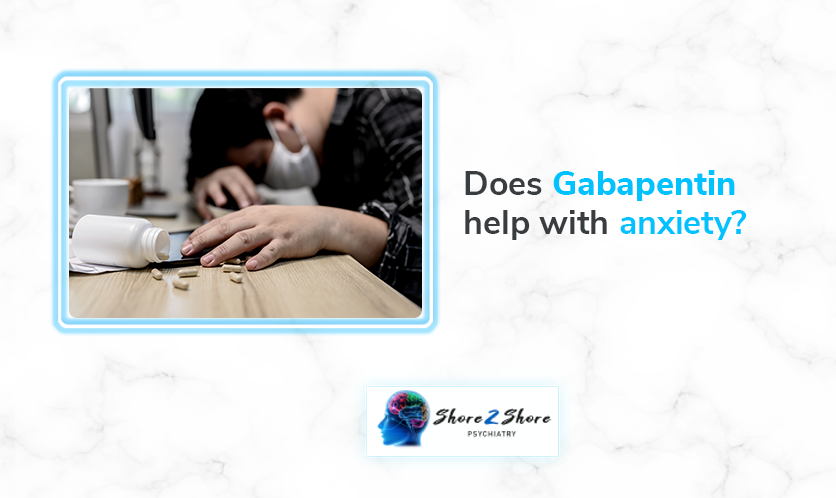Every year, millions face anxiety disorders, the top mental health issue in America. These disorders have a profound impact on the entire state.
Various treatments exist, but some individuals look for different options. Many are curious, “Does gabapentin help with anxiety?”
Let’s dive into this subject, examining gabapentin’s purposes, advantages, possible side effects and thoughts about using it for anxiety relief.
Shore 2 Shore Psychiatry helps people deal with anxiety. Simple, effective tools are available here. You discover a variety of services, walk-in slots and late-night crisis sessions. Reach out today.
What Is Gabapentin?
Gabapentin, identified as Neurontin and Gralise, reduces seizures and nerve distress. The FDA approved it for these uses. However, its use has expanded.
Doctors now prescribe it off-label for anxiety and mood issues. This shift highlights gabapentin’s evolving role, moving from epilepsy treatment to a mental health ally.
Physicians may prescribe gabapentin for several conditions, including:
- Anxiety
- Nerve pain
- Sleep issues
- Panic disorder
These uses are often considered when other treatments do not provide relief.
How Does Gabapentin Work?
Gabapentin works by affecting brain neurotransmitters. It stabilizes electrical activity, reducing seizures. It also modifies nerve transmission, relieving pain and possibly calming mood.
For anxiety, the exact mechanism is unclear. Analysis reveals it heightens comfort chemicals and alleviates stress.
Does Gabapentin Help with Anxiety?
Yes, gabapentin can support anxiety relief in particular cases. As I have said before, it’s not FDA-licensed for anxiety. However, numerous physicians recommend it off-label for anxiety.
- Generalized anxiety disorder
- Social anxiety
- Panic disorder
Patients report experiencing calmer moods and fewer physical symptoms of anxiety, such as:
- Rapid heartbeat
- Muscle tension
The effectiveness of gabapentin for anxiety varies. Some people respond well, while others may need additional or alternative treatments.
Gabapentin Dosage for Anxiety
Converse with your doctor concerning gabapentin, particularly if it’s for anxiety. Maintaining the right dosage is key. The dosage for treating anxiety and nerve pain varies.
Your doctor will tweak this according to your requirements. Starting with a dose of about 300mg is not uncommon. This can be slowly increased based on your response.
The maximum dose of gabapentin 300mg is often used for chronic nerve pain. However, for dealing with anxiety, doses arriving at 900-1800mg a day are not rare, but this comes down to your tolerance.
Track your daily gabapentin dosage for anxiety. It can render you sleepy, disrupting your regular tasks.
Benefits of Gabapentin for Anxiety
Gabapentin has several anxiety benefits:
- Relieves Physical Signs of Anxiety: A racing heart and tense muscles often come with anxiety. Gabapentin soothes these signs, quieting nerves.
- Maintains a Calm Mood: It can help with mood swings and grumpiness. So, it supports mood equilibrium.
- Supports Good Sleep: Gabapentin’s serene impact can enhance sleep, a real boon for those juggling both sleep issues and anxiety.
- Works with Other Treatments: If regular anxiety medicines aren’t enough, gabapentin can be combined with other therapies for better results.
How Long Does It Take Gabapentin to Work for Anxiety?
Gabapentin’s anxiety relief varies by person. Some feel calmer in days, while others wait weeks. Typically, its effects start in the first week.
However, major improvement might take a month for some. Responses to Gabapentin for anxiety are diverse and unpredictable.
Gabapentin and Other Conditions
Gabapentin is also used for various other conditions. Some people take gabapentin for sleep and anxiety. It helps with both. Additionally, it can be effective for conditions such as:
- Panic Disorder: Many users report that gabapentin and panic attacks can effectively manage symptoms.
- Depression: Some studies indicate that gabapentin for depression may also help those dealing with anxiety.
- Stress Management: Questions about gabapentin for stress treatment are common. Though not explicitly approved for it, this medication can help lower anxiety.
Gabapentin vs. Other Anxiety Medications
When considering buspirone vs gabapentin, it’s essential to understand the differences. Clinicians prescribe buspirone mostly for anxiety situations.
On the other hand, gabapentin is the go to option when conventional treatments don’t meet expectations. Both have their successes and setbacks.
So, the right choice between them hinges on personal situations.
Side Effects of Gabapentin
Like every drug, gabapentin can bring about side effects. Some common side effects include:
- Drowsiness
- Dizziness
- Fatigue
- Swelling in extremities
Talk to a doctor for safe gabapentin doses for sleep and other uses. The right dose reduces risks and boosts benefits. Expert advice ensures the best treatment.
Final Thought on Can Gabapentin Be Used for Anxiety?
To talk about the matter, “Does gabapentin help with anxiety?” Gabapentin can provide relief from anxiety for a few people, especially when other treatments fail.
Gabapentin is a good off-label choice since it calms and has low dependency risk.
However, it’s essential to consult a healthcare provider before starting gabapentin. Personalized care ensures the right dose and reduces risks. It helps you maximize the drug’s benefits.
Thinking about gabapentin for anxiety? Talk to Shore 2 Shore’s experts. We offer good treatments for you.
FAQs
Is 300 mg of gabapentin a low dose?
Yes, medical professionals start off at 300 mg. They adjust it for each patient’s unique reaction.
Does gabapentin help with sleep?
Gabapentin can calm nerves and ease pain or anxiety, potentially improving sleep for some people. It’s not made specifically as a sleep aid, but it might enhance rest for certain users.
Is Gabapentin like Xanax?
Anxiety relief comes in various forms. Gabapentin and Xanax are two examples. Gabapentin has a lower risk of addiction and is safer long-term. However, they work differently and have different risks. So, consider their profiles carefully before choosing.
What is the recommended gabapentin dosage for mood stabilization?
Start with 300 mg of gabapentin daily for mood management. Slowly raise the dosage to 900-1,800 mg, split into 2-3 doses. Always consult your doctor for guidance.





No comment